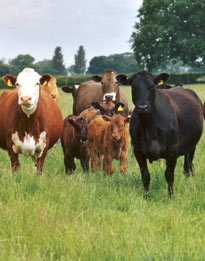Keep suckler stress to a minimum at weaning

Suckler producers should avoid the temptation to wean direct-to-sale to prevent a drop in future demand for their calves, according to Mairead O’Grady, Intervet Schering Plough.
Speaking at an NBA weaning management and cattle handling farm walk, Larne, Northern Ireland, she said sending weanlings straight to the sale would increase the likelihood of disease.
“The sale yard is hugely stressful and full of disease – this, on top of the fact stock are already stressed from weaning, makes it more likely animals will develop pneumomia.” This will not only affect daily liveweight gain, but also increase costs for the purchaser.
“Buyers will remember who they bought their stock from and not buy from them again. To avoid this, stock should be weaned two weeks prior to sale.”
In fact, weaning animals with as little stress as possible is essential for all beef producers to prevent health issues and escalating costs.
“At this time of year it is important to think ahead. At weaning, a calf’s lungs and immune system are still immature, making them highly susceptible to pneumonia.
“This disease can result in huge losses from reduced liveweight gain, increased vet and medicine costs and even death.”
But farmers can reduce the likelihood of calves developing disease by weaning calves gradually.
“Creep gates are a simple and effective way of getting calves used to being away from their mothers,” said Ms O’Grady.
“Cost-wise, creep feeding can be advocated when stock are being weaned for sale. But on a low-cost system, creep grazing may be adequate.”
Where possible, stock should also be weaned in batches and on a fine day to avoid added stress from poor weather.
“Don’t de-horn or dose stock at weaning – delay two weeks to allow them to recover,” she said.
And rather than housing stock directly after weaning, animals should be put on good-quality grass to allow them to thrive and then, once the stress is over, they can then be brought inside.
However, animals should not be housed with wet backs as this will raise humidity in the shed and increase the chances of pneumonia.
“The focus should be on improving air quality inside. Bugs are present in droplets of moisture so damp environments will increase the chances of inhalation.”
Stock should also be vaccinated against pneumonia-causing viruses, so that the course is completed two weeks prior to weaning.
